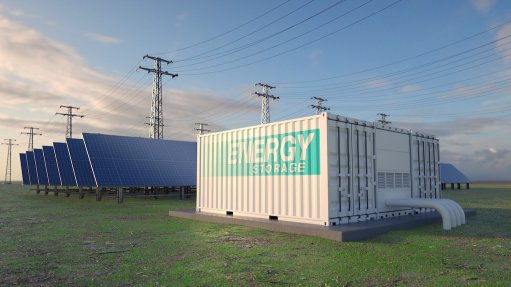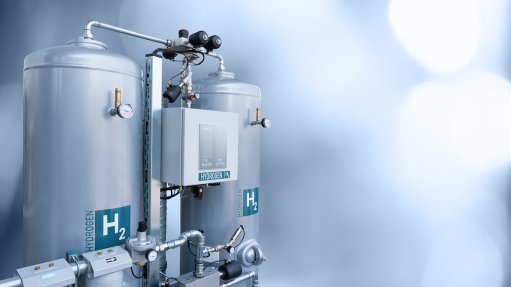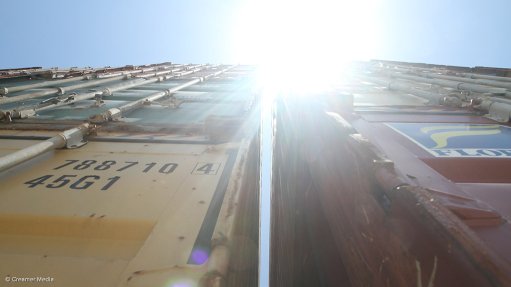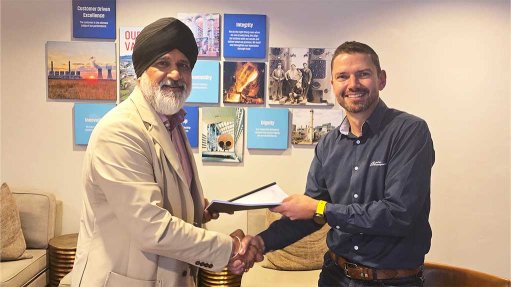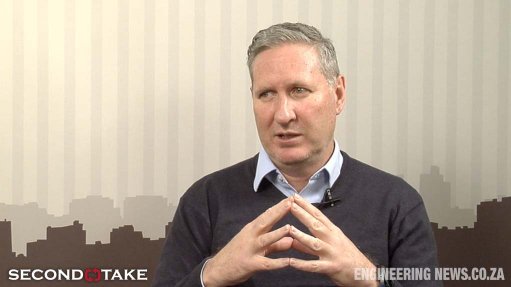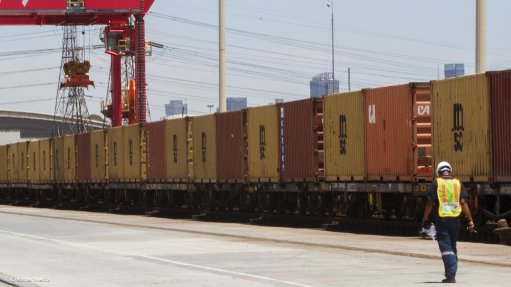Coega and CSIR Partner to Develop SEZ Biofibre Hub
This article has been supplied.
A look inside the existing research facility, equipped with biofibre processing equipment, located at the Coega Special Economic Zone Multi-User Facility. The facility operates under the slogan “Our future is growing”.
The Coega Development Corporation, through its Capital Raising and Sustainability Business Units, together with the Council for Scientific and Industrial Research (CSIR), are undertaking preparatory work towards the establishment of a Biofibre Hub, or Cluster, in the Coega Special Economic Zone (SEZ).
A far-reaching Memorandum of Understanding was signed in June 2021, which forms the foundation of the partnership that will see Coega assisting the CSIR with the commercialisation and industrialisation of considerable intellectual property, while the CSIR will assist in the development of the Coega SEZ’s value proposition in knowledge intensive and advanced manufacturing sectors by becoming the official Research and Development (R&D) Partner of the Corporation.
Coega’s partnership with the CSIR offers SEZ investors the best of South Africa’s innovation capability, including the R&D outputs of the National Innovation Clusters and the R&D produced in the country’s leading research universities through the CSIR network. This is critical for the development of new economic sectors.
According to the CSIR Group Executive for Advanced Chemistry and Life Sciences, Dr Rachel Chikwamba, “The CSIR views this partnership as a necessary doorway to industrialisation. It supports the realisation of the many years of CSIR investment in the natural fibre and composite materials and will further enable rapid commercialisation of other technologies across the CSIR.”
The co-location of advanced and viable R&D capability within an SEZ is imperative to attract foreign direct investment in knowledge intensive and advanced industrial sectors, as Meike Wetsch, Unit Head of Coega’s Capital and Funding Office puts it: “This is standard practice globally. The availability of advanced R&D capability was key in the industrialisation of global technology leaders including South Korea, China, Europe, and the USA.”
Wetsch adds that an industrial demonstration plant and R&D facility are already operational following the relocation of biofibre processing equipment to the Coega SEZ from the CSIR. The Project, once financed, will be further developed in Coega’s Sustainability Business Unit, led by Telly Chauke, Coega’s Chief Sustainability Officer. With a total capital deployment exceeding R1bn over three phases, the Project will include a full-scale industrial manufacturing plant and incubation facilities. These will help emerging industrialists overcome critical barriers to market access.
“Having run numerous enterprise development initiatives within biomanufacturing, nano and advanced materials, as well as agroprocessing, the location of the Biofibre Hub is a strategic move that gives the CSIR global reach, while also making it accessible to emerging industrialists,” states Dr Chikwamba.
The addition of a shared manufacturing facility later in the project, will remove the barriers to entry faced by emerging manufacturers. “Typically, an emerging manufacturer, when seeking offtake from an original equipment manufacturer (OEM), will have to produce a trial run of the component to export standard in a fully accredited manufacturing facility. This trial run is then subjected to acceptance testing at the OEM, and if found suitable, an offtake contract will follow. With very few shared manufacturing facilities in place, this requirement places emerging industrialists in an impossible situation. Nobody is going to fund a production plant at several hundreds of millions with no offtake in place, and no one will sign an offtake agreement without proof that the supplier has manufacturing capability in place,” explained Wetsch.
The plan is to start with an existing small scale industrial plant, and through capital fund-raising, add a large-scale manufacturing plant. “With the large-scale plant, combined with advanced product development and industrial testing facilities in place, the Biofibre Cluster will help emerging industrialists overcome this problem by providing them with production facilities while they are building their market access,” continues Wetsch. “The Biofibre Cluster will develop, and manufacture composites derived from natural sources. The opportunity is then created to add significant value to South African exports and increased export earnings. These commodities are currently exported in their raw or primary form, as inputs to industrial processes elsewhere in the world – we need to bring those manufacturing jobs here,” continued Wetsch.
By adding value locally, the Project is estimated to add sustainable, non-seasonal agricultural jobs in the Eastern Cape, with significant increases in export earnings once the beneficiation of raw agricultural projects starts taking effect. An economic forecast model developed by Meike Wetsch and Dr Langa Blouw of the Eastern Cape Rural Development Agency, for the Department of Economic Development, Environmental Affairs and Tourism, indicates that the Project will create 6,000 additional jobs in the province, with that number reaching 20,000 by the time the full value chain is developed,” says Chauke.
Dr Chikwamba emphasised the importance in technologies translating to societal impact, “We look forward to this sort of impact for our technologies as it translates to the CSIR’s ability to create industrial solutions that stand to change the face of unemployment, particularly for our youth.”
Wetsch insists that South Africa has considerable technological innovation depth that can be very successfully commercialised, but the problem is that existing R&D funding covers only the innovation cycle to prototype level. The final and most expensive stage of industrial demonstration and commercialisation is not covered by existing funding windows. “By crowding in private capital, we not only cover this funding gap, but ensure that our R&D is industry relevant and can be commercialised. In providing the route to commercialisation and further investment, we will be able to create sustainable R&D revenues that can fund our research institutions, thus laying the basis for a knowledge-intensive, innovation economy,” says Wetsch. In support of this, the Impact Area Manager, Professor Suprakas Sinha Ray added, “CSIR has certainly demonstrated its capabilities on natural fibres and developed prototypes that were tested and approved by a select few in the automotive industry. The biggest hurdle has been the ability to serve the same industry on a commercial scale. Emerging industrialists do not have the capacity to supply industry sustainably at desired quantities and quality - they need to be enabled.”
The Coega SEZ is designed based on a cluster model to improve turnaround times and operational efficiencies – the Biofibre Cluster will be a welcome addition to the existing Coega SEZ sector clusters for energy, automotive, metals, chemicals, agroprocessing and aquaculture, maritime, business process outsourcing, and logistics.
“The CSIR/Coega Biofibre Hub “Grow-a-Car” Project, was conceptualised through the partnership, and was recently selected as one of 15 finalists by the UK-based Climate Finance Accelerator in response to a call for innovative, commercially sound, low-carbon projects by the UK Government, that through the Climate Finance Accelerator, will help them find investment. The Project will contribute to the greening of the automotive value chain by supplying bio composites to auto component suppliers. The CSIR has already developed several applications including interior door panels and parcel trays for the automotive industry. The prototypes were found befitting for commercial use. “This is critical for maintaining the competitiveness of the export-facing automotive sector, especially as carbon pricing on exports starts taking effect,” concluded Wetsch.
Comments
Press Office
Announcements
What's On
Subscribe to improve your user experience...
Option 1 (equivalent of R125 a month):
Receive a weekly copy of Creamer Media's Engineering News & Mining Weekly magazine
(print copy for those in South Africa and e-magazine for those outside of South Africa)
Receive daily email newsletters
Access to full search results
Access archive of magazine back copies
Access to Projects in Progress
Access to ONE Research Report of your choice in PDF format
Option 2 (equivalent of R375 a month):
All benefits from Option 1
PLUS
Access to Creamer Media's Research Channel Africa for ALL Research Reports, in PDF format, on various industrial and mining sectors
including Electricity; Water; Energy Transition; Hydrogen; Roads, Rail and Ports; Coal; Gold; Platinum; Battery Metals; etc.
Already a subscriber?
Forgotten your password?
Receive weekly copy of Creamer Media's Engineering News & Mining Weekly magazine (print copy for those in South Africa and e-magazine for those outside of South Africa)
➕
Recieve daily email newsletters
➕
Access to full search results
➕
Access archive of magazine back copies
➕
Access to Projects in Progress
➕
Access to ONE Research Report of your choice in PDF format
RESEARCH CHANNEL AFRICA
R4500 (equivalent of R375 a month)
SUBSCRIBEAll benefits from Option 1
➕
Access to Creamer Media's Research Channel Africa for ALL Research Reports on various industrial and mining sectors, in PDF format, including on:
Electricity
➕
Water
➕
Energy Transition
➕
Hydrogen
➕
Roads, Rail and Ports
➕
Coal
➕
Gold
➕
Platinum
➕
Battery Metals
➕
etc.
Receive all benefits from Option 1 or Option 2 delivered to numerous people at your company
➕
Multiple User names and Passwords for simultaneous log-ins
➕
Intranet integration access to all in your organisation






